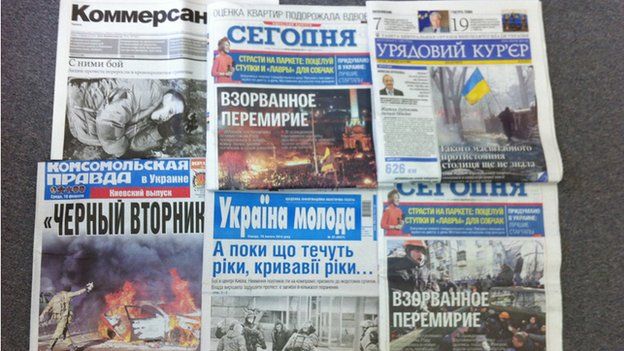Media shock and despair over Ukraine assault
- Published

Commentators in Ukraine and the wider region are appalled by the use of force against protesters in Kiev's main protest camp. Front pages carry harrowing pictures from the Maidan, with headlines speaking of "rivers of blood".
In Russia, there are fears of a civil war in neighbouring Ukraine and predictions that the protests will fail because of a lack of Western support.
An influential German newspaper calls for Western sanctions, while a French writer urges a boycott of the Sochi Olympics in protest against Russia's possible involvement in the Ukrainian crisis.
In Ukraine, the main headline in independent broadsheet Den is a quote from a poem by Vasyl Symonenko: "There is no more room for graves at the cemetery of killed illusions." The daily also publishes a gallery of harrowing images from last night's clashes, headlined "Dictatorship of hatred".
"Shattered truce" is the front-page headline in the popular daily Segodnya, which is of the opinion that "Ukraine is on fire again". Speaking about chances for a peaceful parliamentary solution to the crisis, political expert Vadym Karasyov tells Segodnya that "they are melting away fast".
'Bloody Tuesday'
Under the front-page headline "Bloody Tuesday", the Ukrainian edition of Russian daily Komsomolskaya Pravda accuses opposition leaders of being unwilling to reach a compromise with the government. More than that, the paper goes on, they are no longer able to control the protesters and "things are getting out of hand".
The daily also interviews commentator Kost Bondarenko, who argues that "realistically, neither side did anything to avoid bloodshed".
The front-page headline in opposition-minded daily Ukrayina Moloda speaks of "rivers of blood" flowing in Kiev. "The politicians' inability to reach a compromise resulted in the violent clashes. The authorities decided to strangle the protest," says the paper.
Glavkom, a news and analysis website, argues that the police assault on the protesters in Kiev may eventually land President Viktor Yanukovych in the International Criminal Court in The Hague. "From now on, he has two options: go to Moscow or The Hague. It is up to the Maidan to decide when the president should start packing," it says.
"Chechnya apart, this must be one of the hardest nights in my life," says Arkadiy Babchenko, a seasoned war correspondent from Russia. "I don't understand how the protesters have been able to survive all this," he writes on Facebook.
Ihor Lutsenko, a prominent opposition activist, also writes of the tense and violent night in Kiev's main Independence Square: "All the women in the Maidan were so beautiful that you thought this was a beauty you could only see for the last time."
Serhiy Vysotsky, a columnist at Liga.net website, believes that brute force will not resolve the conflict. "The Maidan can be cleared with heavy machine-guns, but this will only move the stand-off to other streets, leading to partisan warfare in Kiev."
'Civil war'
Russia's influential daily Kommersant is also alarmed by the violence in Kiev. "Ukraine has never been so close to a civil war. Yesterday's developments in Kiev have basically annihilated the positive results achieved in talks between the authorities and the opposition."
"The Maidan cannot succeed", declares a headline in Russian pro-government daily Izvestiya. If it did, says the paper, Ukraine would disintegrate into two parts, one which would become a burden on the EU and another which would boost Russia's role. According to Izvestiya, this is one reason why the West is reluctant to help the protesters: it wants to preserve Ukraine as "an anti-Russian buffer zone".
Germany's influential Frankfurter Allgemeine Zeitung agrees that "the danger of a civil war is huge" in Ukraine. Laying the blame squarely at President Viktor Yanukovych's door, the paper urges the European Union to impose sanctions.
"Many of the Ukrainian oligarchs who have propped up Yanukovych's rule so far have financial interests in the West. The EU should immediately make it clear to them what they have to lose," says the paper. "The time for sanctions has come," it concludes.
Writing on the website of the French daily Le Monde, philosopher Bernard-Henri Levy appeals for a boycott of the continuing Sochi Olympics in protest against Russia's possible involvement in the crisis. Levy accuses Russian President Vladimir Putin of "killing" Olympic ideals and says athletes are competing "as if nothing is happening" a few hundred kilometres away. "Do they not sense that this time their medals smell of blood?" the writer asks.
If the West doesn't make a stand at the Olympics, they will go down in history as "the Games of shame and of Europe's defeat", Levy says.
BBC Monitoring reports and analyses news from TV, radio, web and print media around the world. For more reports from BBC Monitoring, click here. You can follow BBC Monitoring on Twitter and Facebook.
- Published19 February 2014
- Published19 February 2014
- Published12 August 2016